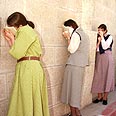
Women Only
צילום: זום 77
500 year old 'feminist' siddur reissued in Hebrew
Rabbi Meir Benbensihti formulated a siddur in Ladino dedicated to women over 500 years ago; now, for first time it is being published in Hebrew
"Women need a different prayer book from the one used by men," 16th century Rabbi Meir Benbenishti once said and decided to take the mission of creating such a prayer book upon himself. The siddur, 'Seder Nashim' was written in Ladino as at the time many women did not know Hebrew, is now seeing the light of day in Hebrew in a new edition published by the Ben Zvi Institute.
While most of the women in Europe who prayed tended to do so from the 'regular' siddur, the prayer book created by Rabbi Benbenishti is completely different.
In the preface he writes that women are usually prevented from praying because "men are concerned that the prayers are too long and so women will neglect to care for their children," thus, he sought a way to instruct them in prayer "without taking away from their role as mothers."
As someone who believed that women were obligated to pray, Benbenishti taught his daughters to read and write in Ladino and decried past practices when women did not know how to read and write. He recommended that every man "teach his daughter a little writing every evening."
The unique aspect of Benbenishti's 'women's siddur' is that side by side with the regular halachot regarding women the siddur also features halachot showing women how to conduct a Jewish lifestyle when there is no presence in her life. These include 'Eruv' laws, mezuzah and more.
The siddur also includes a Passover haggaddah for women holding the Passover seder on their own which is written in the feminine gender grammatically.
The author stresses that women must be taught to put extra emphasis on the thanksgiving portions of the haggaddah in order to "strengthen their faith."
The blessing of "Who Has Not Made Me a Woman" (Shelo Asani Isha) has been removed from the Siddur, though no other version was put in its place.
Though it many not have transcended any known boundaries but on many levels this prayer book includes a 500 year old feminist message. Side by side with the 'women only' prayers, many of the prayers were removed as the author assumed that women do not need to and cannot pray with the community due to her total commitment to raising her children.
At the end of the preface, editor Ora Schwarzwald wonders why the siddur which contributed so much to the woman's position 500 years ago failed to create a response that propelled the formation of other siddurim like it.
"It would seem that men's opinions tipped the scales," she explains, "most likely they didn't regard the increased education of the Jewish woman so that she no longer needed men in order to understand and carry out the mitzvot favorably."










